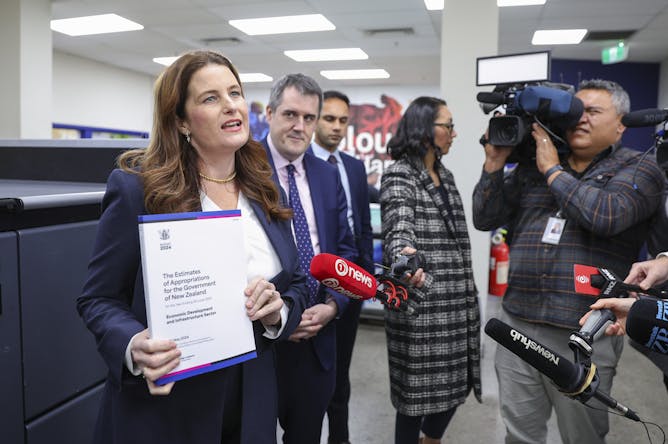|
|
|
|
Nau mai, haere mai.
Like so many countries whose economies have been based on extractive industries, New Zealand has a conflicted relationship with mining. A source of wealth and jobs on the one hand, environmentally damaging and dangerous on the other.
So, when Resources Minister Shane Jones announced the coalition government’s draft minerals strategy recently, there was bound to be a polarised debate. It doesn’t help that Jones has sometimes been dismissive of ecological and climate concerns. But partisan point scoring aside, there is more nuance and complexity to the issue than might first meet the eye.
As Martin Brook writes today, many of the “critical minerals” required for transitioning to greener and cleaner technologies must be mined in the first place. “The International Energy Agency identifies minerals such as copper, lithium, nickel, cobalt and rare earth elements as essential components in many of today’s rapidly growing clean energy technologies – from wind turbines and electricity networks to electric vehicles.”
Whether or not New Zealand has deposits of those minerals in economically or environmentally sustainable concentrations is one question. Another is whether New Zealanders are content to “effectively outsource the risks of mining to other countries, while benefiting from the modern technologies those minerals make possible”.
Ultimately, Brook argues, a degree of consistency is required. “To assume foreign landscapes and environments are more expendable raises serious ethical and moral questions that need to be addressed within the current debate over the government’s draft mining strategy.”
Finally, please consider supporting our work in any way you can. We’re now halfway through our fundraising campaign and 40% towards our target. Every day we are commissioning and publishing the expert, evidence-led analysis you can find here and on our homepage, and every contribution helps. Thank you, and until next week, mā te wā.
|

|
Finlay Macdonald
New Zealand Editor
|
|

Martin Brook, University of Auckland, Waipapa Taumata Rau
Shane Jones’ draft mining strategy is politically divisive. But New Zealand must face the practical and ethical implications of its own reliance on the critical minerals extracted elsewhere.
|

Julia J Rucklidge, University of Canterbury; Elena Moltchanova, University of Canterbury; Roger Mulder, University of Otago; Siobhan A Campbell, University of Canterbury
Adding vitamin and mineral supplements to the diet of pregnant women with antenatal depression not only reduced their symptoms and improved their functioning – it also benefitted their infants.
|

Timothy Welch, University of Auckland, Waipapa Taumata Rau; Anna Matheson, Te Herenga Waka — Victoria University of Wellington; Craig Elliffe, University of Auckland, Waipapa Taumata Rau; Dennis Wesselbaum, University of Otago; Hiran Thabrew, University of Auckland, Waipapa Taumata Rau; Julia Talbot-Jones, Te Herenga Waka — Victoria University of Wellington; Mark Barrow, University of Auckland, Waipapa Taumata Rau
Finance minister Nicola Willis made good on two promises with her first budget – tax cuts and no surprises. But the belt tightening required to do that will have longer-term consequences.
|

Laura Johnstone, University of Canterbury; Ariela Zibiah, University of Canterbury; Josephine Varghese, University of Canterbury; Linda Mussell, University of Canterbury
Public submissions close this week on a bill restoring citizenship to some Samoan immigrants. But despite prime ministerial apologies over the 1970s dawn raids, immigration law is largely unchanged.
|

Win Thandar Zaw, University of Waikato
A ‘right to repair’ bill before parliament aims to reduce the cost and difficulty of fixing consumer items. Setting minimum acceptable lifespans for common products should be the first step.
|

Kirsten Locke, University of Auckland, Waipapa Taumata Rau; Alex Gunn, University of Otago; Katrina McChesney, University of Waikato
An ‘apprenticeship’ system would undermine teaching’s role as a profession, and separate trainees from the evolving research and knowledge that university-based training provides.
|

Dennis Wesselbaum, University of Otago
Spikes in inflation are often blamed on government borrowing to deliver cash handouts. But it’s more complicated than that. The real issue lies in borrowing without a plan to balance the books.
|
From our foreign editions
|

Imran Ali, CQUniversity Australia
Severe weather and disease in Brazil’s main growing regions have led to a major global shortage. Australia does grow a lot of its own oranges, but still relies heavily on imported juice.
| |

Hugo Olierook, Curtin University; Hamed Gamaleldien, Curtin University
The very early Earth may not have been as inhospitable as scientists thought, with life perhaps starting more than 4 billion years ago.
|

Mlungele M. Nsikani, South African National Biodiversity Institute
More than 700 million hectares of land in Africa has been degraded by human activity. Everyone can get involved in restoring the ecology.
| |

Lawrence Hamilton, University of the Witwatersrand
Solutions driven by the private sector are only for those who can pay, and also end up driving public priorities.
|

Anupama Sen, University of Oxford; Sam Fankhauser, University of Oxford
Pursuing net zero will cost UK citizens around £5 a week per person – new study.
| |

Carl Senior, Aston University; Erik P. Bucy, Texas Tech University; Patrick Stewart, University of Arkansas
Study shows that even people who didn’t vote for Boris Johnson in 2019 were swayed by his grin.
|

Luis Gómez Romero, University of Wollongong
What can Mexico expect from the former mayor of the capital after an historic election?
| |

Christopher K. Tong, University of Maryland, Baltimore County
Beijing’s cyber operations are largely conducted in the shadows. But a recent leak has shed light on how the state is working with private companies to target online activism.
|
|
|
| |
| |
| |

|
| |
| |
| |
| |
| |
| |
|
|
|
|
|
|
|